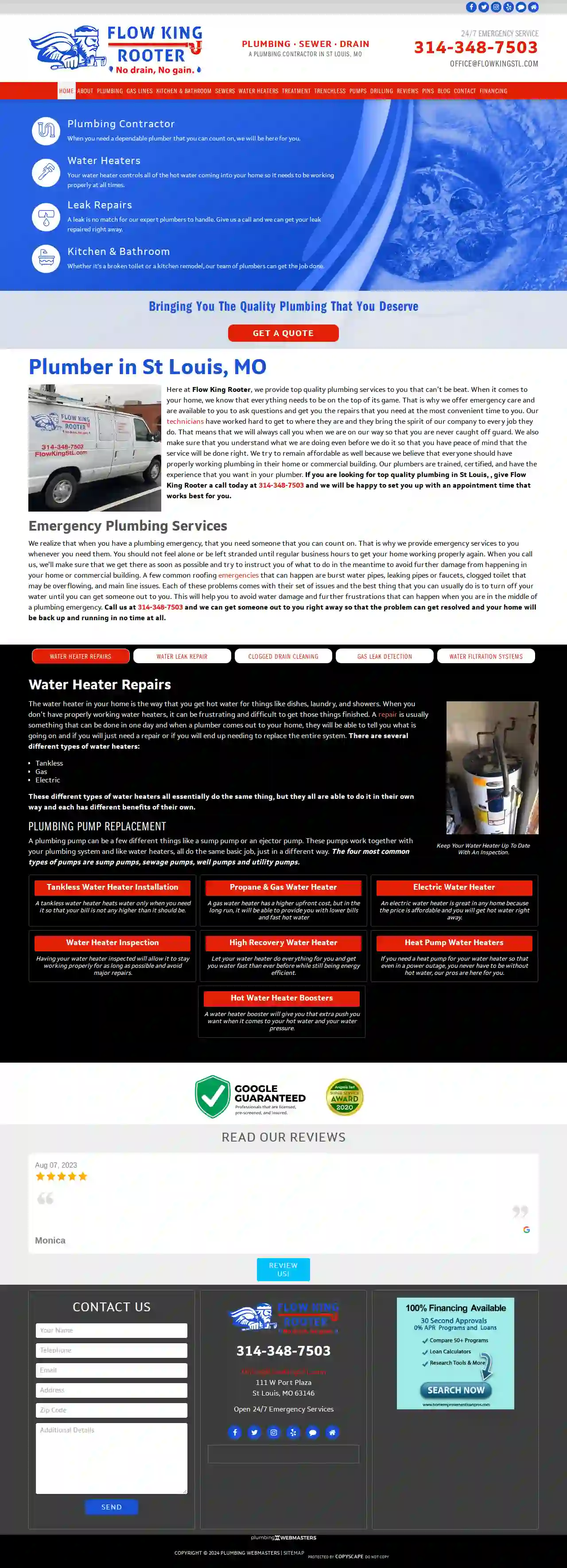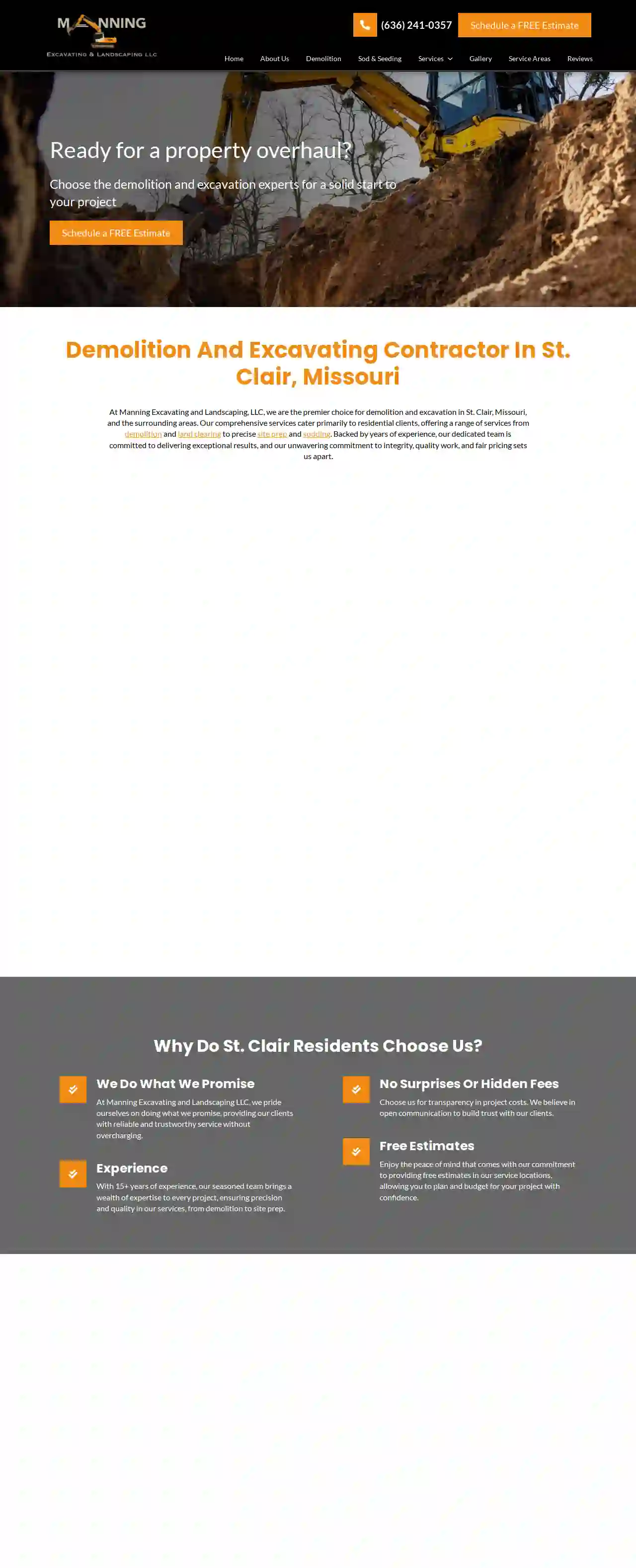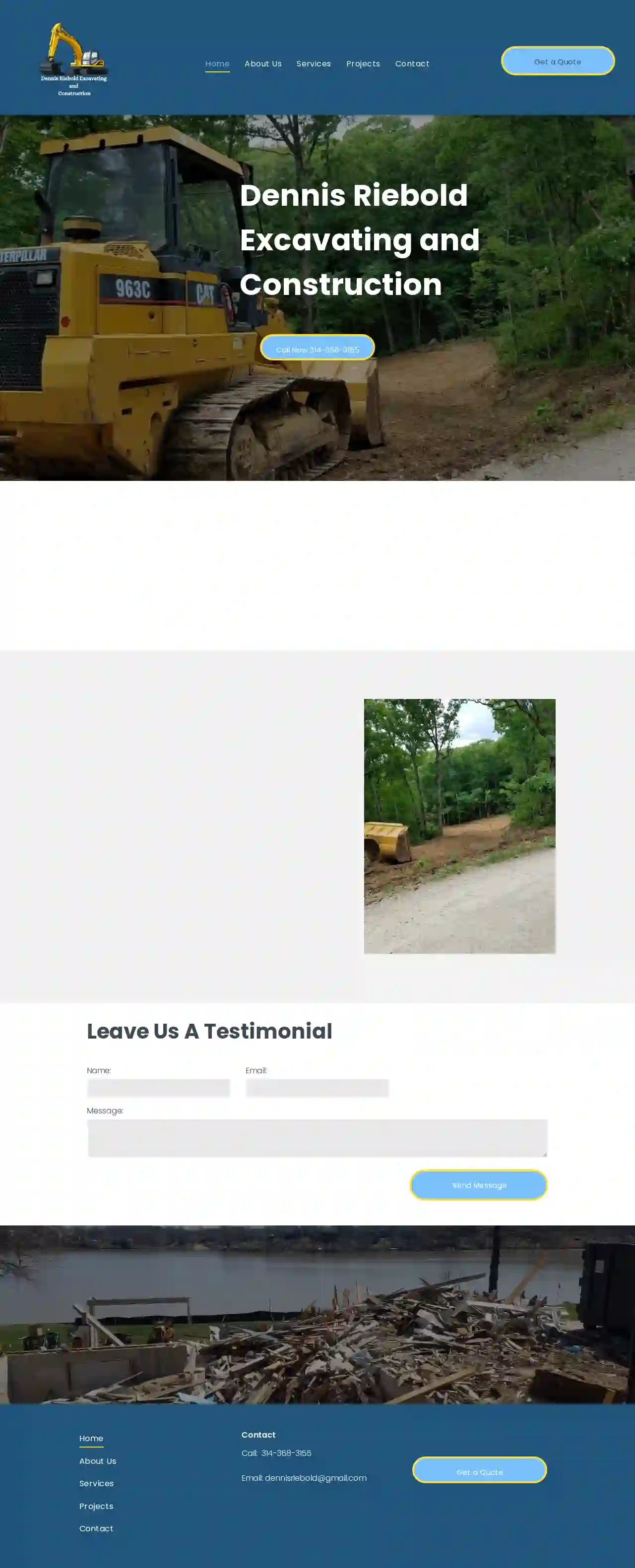Demolition Contractors St. Ann
Find Demolition Contractor in St. Ann
Receive 3 FREE Structure Demolition quotes for your project today! Compare profiles, reviews, accreditations, portfolio, etc... and choose the best service.

Flow King Rooter
4.786 reviews111 W Port Plaza, 111 W Port Plaza St Louis, MO, St. Louis, 63146, USWhen you need a dependable plumber that you can count on, we will be here for you. Here at Flow King Rooter, we provide top quality plumbing services to you that can’t be beat. When it comes to your home, we know that everything needs to be on the top of its game. That is why we offer emergency care and are available to you to ask questions and get you the repairs that you need at the most convenient time to you. Our technicians have worked hard to get to where they are and they bring the spirit of our company to every job they do. That means that we will always call you when we are on our way so that you are never caught off guard. We also make sure that you understand what we are doing even before we do it so that you have peace of mind that the service will be done right. We try to remain affordable as well because we believe that everyone should have properly working plumbing in their home or commercial building. Our plumbers are trained, certified, and have the experience that you want in your plumber. If you are looking for top quality plumbing in St Louis, , give Flow King Rooter a call today at 314-348-7503 and we will be happy to set you up with an appointment time that works best for you.
- Services
- Why Us?
- Gallery
Get Quote
Flow King Rooter Plumbing
512 reviews111 W Port Plaza, 111 W Port Plaza St Louis, MO, St. Louis, 63146, USWhen you need a dependable plumber that you can count on, we will be here for you. Here at Flow King Rooter, we provide top quality plumbing services to you that can’t be beat. When it comes to your home, we know that everything needs to be on the top of its game. That is why we offer emergency care and are available to you to ask questions and get you the repairs that you need at the most convenient time to you. Our technicians have worked hard to get to where they are and they bring the spirit of our company to every job they do. That means that we will always call you when we are on our way so that you are never caught off guard. We also make sure that you understand what we are doing even before we do it so that you have peace of mind that the service will be done right. We try to remain affordable as well because we believe that everyone should have properly working plumbing in their home or commercial building. Our plumbers are trained, certified, and have the experience that you want in your plumber. If you are looking for top quality plumbing in St Louis, , give Flow King Rooter a call today at 314-348-7503 and we will be happy to set you up with an appointment time that works best for you.
- Services
- Why Us?
- Gallery
Get Quote
Ammerman Excavating & Services
2.52 reviews100 Ammerman Rd, York, 17315, USAmmerman Excavating: Your Trusted Partner for Excavation Services Ammerman Excavating is a family-owned and operated business with over 20 years of experience in the excavation industry. We are committed to providing our clients with high-quality services at competitive prices. Our team of experienced professionals is dedicated to delivering exceptional results on every project, no matter how big or small. We understand that excavation projects can be complex and require a high level of expertise. That's why we take a personalized approach to every job, working closely with our clients to ensure their needs are met. From site preparation to utility installation, we handle all aspects of your excavation project with precision and care. At Ammerman Excavating, we are committed to safety and environmental responsibility. We use the latest equipment and techniques to minimize our impact on the environment and ensure the safety of our workers and the public. Contact us today to discuss your excavation needs. We are confident that we can provide you with the best possible service.
- Services
- Why Us?
Get Quote
St. Louis Excavation
583 reviews628 Brandon Ln., St Clair, 63077, USMunicipal & Residential Sewer Repair For over 30 years our family owned and operated excavation company has been completing residential sewer repairs and municipal sewer contracts in the greater Saint Louis area. Our company mission is to set the standard for professional excavation services in Saint Louis. Emergency Crews If you have a sewer emergency, please call to speak with an experienced professional who will begin the process of restoring your loss as quickly as possible. We can diagnose and complete your repair, reducing the amount of time you are inconvenienced. Call us 24/7 for drain cleaning, flooded basements, or sewer backups. Qualifications Master Plumbers Master Drainlayers St. Louis City & County Licensed Wastewater Treatment Operators DIS III Distribution License
- Services
- Why Us?
- Testimonials
- Gallery
Get Quote
Bullseye Contracting llc
57 reviewsSt. Louis, USBuilding Trust with Quality Work Bullseye Contracting offers general excavation work including: pond & lake building, road & property line clearing, leveling roads, culvert & ditch installation, basement excavation, demolition, hauling, soil retention, brush clearing, water retention & diversion, wildlife land management, hunting food plots and pad prep for portable storage sheds & buildings! We offer an end-to-end client experience that includes communication, budgeting, staffing, on-site organization, along with solid, quality handiwork every time. Our mission at Bullseye Contracting is to provide our clients with exceptional construction services that exceed their expectations. We strive to deliver high-quality workmanship, on-time completion, and cost-effective solutions.
- Services
- Why Us?
- Gallery
Get Quote
Manning Excavating and Landscaping, LLC
523 reviewsSaint Clair MO, Saint Clair, 63077, USManning Excavating and Landscaping, LLC: Your Trusted Partner for Demolition and Excavation in St. Clair, Missouri At Manning Excavating and Landscaping, LLC, we are the premier choice for demolition and excavation in St. Clair, Missouri, and the surrounding areas. Our comprehensive services cater primarily to residential clients, offering a range of services from demolition and land clearing to precise site prep and sodding. Backed by years of experience, our dedicated team is committed to delivering exceptional results, and our unwavering commitment to integrity, quality work, and fair pricing sets us apart. We understand that your property is an investment, and we treat it with the utmost care and respect. Our team of skilled professionals is equipped with the latest technology and equipment to ensure that your project is completed on time and within budget. We are also committed to providing our clients with clear and concise communication throughout the entire process. Whether you are planning a new construction project, a renovation, or simply need some land cleared, Manning Excavating and Landscaping, LLC is the company to call. Contact us today for a free estimate.
- Services
- Why Us?
- Gallery
Get Quote
Riebold Excavating & Construction .
54 reviewsSt. Louis, USDennis Riebold Excavating and Construction Dennis Riebold Excavating and Construction has been in business for over 30 years, developing subdivisions, new construction, custom homes, and commercial sites. We also do a lot of tear-down work; removing old driveways and tearing down buildings so that the site can be redeveloped. Our experience in excavation, grading, and underground utility installation gives us a unique edge in the industry. We are able to take on projects from start to finish, designing and developing the site as needed. We take pride in our reputation as a professional contractor who always puts the customer first. With our extensive experience in all aspects of excavation and construction, we can handle any project, large or small. We're also experts at tearing out old driveways and preparing sites for new pavement.
- Services
- Why Us?
- Gallery
Get Quote
Kolb Grading LLC
3.530 reviews5731 Westwood Drive, Weldon Spring, 63304, USBuilding Midwest Transportation Expansive projects connecting critical infrastructure. We're clearing the way! Traditional Values Let us look at your project. We’ll bring our experience and creativity to the table, crafting a proposal that will maximize quality, efficiency, safety and budget. Forward Thinking Keeping a fleet of new, state-of-the-art, well-maintained equipment results in greater efficiency, delivers a high-quality result, reduces downtime and increases crew member safety. Our in-house fleet of equipment is extensive with new additions arriving on a regular basis. Outstanding Results By performing extensive research and preplanning, we are able to develop a project plan with proposed alternate courses of action to surmount obstacles and to assure the successful completion of your project on time and with superior punctuality. The Kolb Advantage Simply put: we’ll manage it. All of it. We’ll coordinate every aspect of a project.
- Services
- Why Us?
- Gallery
Get Quote
Williams Construction & Excavating, LLC
51 reviews21726 Palmer Lane, Saint Mary, 63673, USOver 45 Years of Experience Williams Construction & Excavating, LLC is a local, family-owned excavation company dedicated to delivering the best possible results on every project. We specialize in several areas, including septic installation, constructing lakes and ponds, soil and water projects, demolition, and general excavating. We are equipped with a wide range of machinery to meet the needs of residential, commercial, and agricultural projects. Kenny Williams, the owner of Williams Construction & Excavating, has been in the business for over 45 years. Kenny's knowledge and experience allow him to deliver the high-quality results his customers expect. Born and raised in the Ozora, Missouri area, Kenny knows the diversity of the soils and the rock layers in Ste. Genevieve, Perry, St. Francis, and Cape counties. Williams Construction & Excavating, LLC is a second-generation-owned and third-generation-run business. Floyd Williams began the company back in 1973, and he passed it down to Kenny in 2014. Kenny's sons, Joe and Jonathan, both work for the family business. Our Team Left to Right: Jonathan Williams, Joe Williams, and Kenny Williams
- Services
- Why Us?
- Our Team
- Gallery
Get Quote
Drainscapes STL
526 reviews17209 Chesterfield Airport Rd PMB 132, Chesterfield, 63005, USDrainscapes The Experts in Storm Water Diversion Since 1998 Drainage Systems Prevent Water Accumulation Count on Drainscapes for cost-effective drainage solutions to prevent water from accumulating on and around your home or property. Water Repurposing Stormwater Collection With our stormwater systems, you can collect stormwater for slow release as groundwater, or reuse the collected stormwater as surface water, keeping the water out of municipal drainage systems. Excavation Excavating services, including backhoe, skid steer, and mini excavator work. We handle all aspects of concrete/hardscape demolition, material transfer, grading, digging, hauling, forestry clearing, and more! Best Management Practices Drainscapes STL LLC now offers Best Management Practice (BMP) Inspections for Storm Water Management facilities Exciting News! Drainscapes is now a Certified Professional in Erosion and Sediment Control (CPESC). This prestigious title exemplifies our ample knowledge in the design and implementation of controlling runoff and soil losses during storm events. Serving Residential, Commercial, and Municipal Clients "We are a Drainage Company" We install engineered drainage systems in Greater St. Louis and St. Charles County in Missouri and Monroe and St. Clair Counties in Illinois. We have years of experience allowing us to address every aspect of rainwater management from roof to soil. Each new Drainage System comes with manufacturer and installer warranties, ensuring that your investment is secure. "We Specialize In StormWater Management" Our unique blend of exterior drainage and rain water management utilizing quality materials truly separates us from the competition. We have experienced, long-term, employees ensuring you of quality work. Drainscapes has offered design, maintenance, and installation of rain displacement systems for residential, commercial and municipal markets since 1998. Contact our drainage company, to schedule a site evaluation.
- Services
- Why Us?
- Testimonials
- Gallery
Get Quote
Over 22,076+ Excavation Companies on our directory
Our excavation contractors operate in St. Ann & surrounding areas!
ExcavationHQ has curated and vetted the Best Excavation Contractors in and around St. Ann. Find a reliable contractor today.
Frequently Asked Questions About Demolition Contractors
- Safety: Experienced contractors have the knowledge, skills, and safety training to execute demolitions safely, minimizing risks to workers and surrounding areas.
- Efficiency: Contractors have the specialized equipment and expertise to complete demolitions efficiently, saving time and reducing project costs.
- Compliance: Reputable contractors are familiar with local regulations and permitting requirements, ensuring compliance and avoiding legal issues.
- Waste Management: Contractors have waste management plans to handle debris responsibly, including recycling and proper disposal.
- Liability Protection: Insured contractors protect you from financial responsibility for accidents or damages during the demolition process.
- Clear the Site: Remove all furniture, appliances, personal belongings, and any valuable items from the structure.
- Secure the Perimeter: Fence off the demolition area to prevent unauthorized access and protect surrounding property.
- Disconnect Utilities: Arrange for the disconnection of electricity, gas, water, and other utilities servicing the building.
- Hazardous Material Abatement: If asbestos, lead paint, or other hazardous materials are present, have them professionally removed before demolition begins.
- Notify Neighbors: Inform your neighbors about the demolition schedule to minimize disruptions and address any concerns.
- Obtain Permits: Ensure all necessary demolition permits are in place before starting work.
What are the benefits of hiring a professional demolition contractor?
How do I prepare my property for demolition?
What is the difference between demolition and deconstruction?
Demolition: Typically involves bringing down a structure quickly and efficiently, often using heavy machinery and potentially explosives. The primary goal is to clear the site.
Deconstruction: Focuses on carefully dismantling a building piece by piece to salvage reusable materials. It prioritizes minimizing waste and environmental impact, often involving manual labor and specialized tools.
The choice between demolition and deconstruction depends on the project's objectives, budget, and environmental considerations.
What is asbestos abatement?
What are the benefits of hiring a professional demolition contractor?
- Safety: Experienced contractors have the knowledge, skills, and safety training to execute demolitions safely, minimizing risks to workers and surrounding areas.
- Efficiency: Contractors have the specialized equipment and expertise to complete demolitions efficiently, saving time and reducing project costs.
- Compliance: Reputable contractors are familiar with local regulations and permitting requirements, ensuring compliance and avoiding legal issues.
- Waste Management: Contractors have waste management plans to handle debris responsibly, including recycling and proper disposal.
- Liability Protection: Insured contractors protect you from financial responsibility for accidents or damages during the demolition process.
How do I prepare my property for demolition?
- Clear the Site: Remove all furniture, appliances, personal belongings, and any valuable items from the structure.
- Secure the Perimeter: Fence off the demolition area to prevent unauthorized access and protect surrounding property.
- Disconnect Utilities: Arrange for the disconnection of electricity, gas, water, and other utilities servicing the building.
- Hazardous Material Abatement: If asbestos, lead paint, or other hazardous materials are present, have them professionally removed before demolition begins.
- Notify Neighbors: Inform your neighbors about the demolition schedule to minimize disruptions and address any concerns.
- Obtain Permits: Ensure all necessary demolition permits are in place before starting work.
What is the difference between demolition and deconstruction?
Demolition: Typically involves bringing down a structure quickly and efficiently, often using heavy machinery and potentially explosives. The primary goal is to clear the site.
Deconstruction: Focuses on carefully dismantling a building piece by piece to salvage reusable materials. It prioritizes minimizing waste and environmental impact, often involving manual labor and specialized tools.
The choice between demolition and deconstruction depends on the project's objectives, budget, and environmental considerations.
